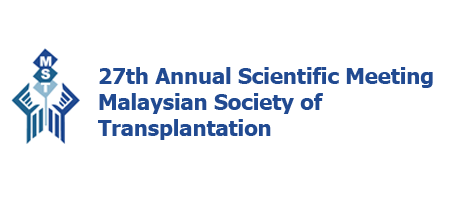Designation
Consultant Haematologist
Institution
Hospital Sultanah Aminah, Johor Bahru
Qualification
- MBBS (London) University College London, United Kingdom
- Doctor of Internal Medicine Universiti Kebangsaan Malaysia
- Gazetted as Internal Medicine Specialist by Ministry Of Health Malaysia Registered as Medical specialist
- Inducted as Ordinary Member College of Physician, Academy of Medicine Malaysia
- Completed 3-years training for Clinical Hematology under the auspice of Malaysian Society of Hematology
Special field of interest
-
Abstract
| Title: |
Curing Cancer with Stem Cell Transplantation |
| Body: |
Stem cell transplantation(SCT) is one of the many modalities available to treat cancer which include surgery, radiotherapy, chemotherapy and targeted therapy. Stem cell are unique cells that have the potential to differentiate into various cell types or divide indefinitely to produce other stem cells ie pluripotent. There are various types of stem cell present which include embryonic stem cells, adult stem cells, perinatal stem cells and mesenchymal stem cells. This lecture is focused on hematopoietic stem cell (HSCT) is a type of adult stem cell able to differentiate into all types of blood cells & immune cells. HSCT is a procedure in which a patient receives healthy stem cells to replace damaged stem cells. HSCT involves various steps including harvesting/ stem cell mobilisation, conditioning chemotherapy, stem cell infusion and finally engraftment. There are 2 types of SCT namely autologous SCT (AutoSCT) whereby the patient├???├??├?┬ó??s own stem cells are utilised and allogeneic SCT whereby a healthy donor stem cells are utilised. HSCT effect cure via 2 different mechanism namely myeloablation chemotherapy and immune reconstitution ie graft vs leukaemia (GvL) effect. Indications for AutoSCT include upfront AutoSCT with curative intent eg Mantle Cell Lymphoma is 1st compete remission CR1), consolidation therapy eg Myeloma and as salvage therapy eg Hodgkin Lymphoma in 2nd complete remission. AutoSCT is well tolerated with low Treatment Relative Mortality (<5%) and its main disadvantage is disease relapse/ recurrence. There are various types of AlloSCT depending on the degree of HLA type matching with the recipient namely Matched Related Donor (MRD), Matched Unrelated Donor (MUD), Mismatch Donor and Haplo SCT. HLA matching is closely related to the success of AlloSCT. MRD is also associated with the lowest risk of Graft Versus Host Disease (GvHD) which is a unique complication of AlloSCT. AlloSCT is curative in Very Severe Aplastic Anaemia (VSAA) and High risk Myelodysplastic Syndrome (MDS) and markedly improve the overall survival in most Acute Leukaemia. However, AlloSCT is associated with much higher TRM (10 - 30%) and risk of GvHD (10 - 50%). |
| |
(62.58 KB) |

